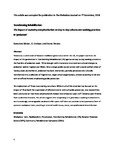Transforming Rehabilitation: The Impact of Austerity and Privatisation on Day-to-Day Cultures and Working Practices in 'Probation'
| dc.contributor.author | Walker, S | |
| dc.contributor.author | Annison, CJ | |
| dc.contributor.author | Beckett, Sharon | |
| dc.date.accessioned | 2019-01-10T18:38:43Z | |
| dc.date.issued | 2019-03-01 | |
| dc.identifier.issn | 0264-5505 | |
| dc.identifier.issn | 1741-3079 | |
| dc.identifier.uri | http://hdl.handle.net/10026.1/13121 | |
| dc.description.abstract |
Viewed as a culmination of broader neoliberal governance within the UK, this paper examines the impact of the government’s Transforming Rehabilitation (TR) agenda on day-to-day working cultures at the frontline of probation work. TR has brought with it extensive structural and cultural changes to probation work in England and Wales. Once a single public-sector service with a social welfare ethos of ‘advise, assist and befriend’, probation has been dismantled, partially privatised and culturally transformed into a collection of fragmented, target-driven organisations, divided according to risk and with an official rhetoric emphasising public protection. The implications of TR are now starting to surface. While much of this attention has focused on the impact of TR on both the supervision of offenders and in terms of public protection, less research has been conducted on how these organisational changes have impacted upon staff. Drawing upon findings from qualitative research, this article suggests that deepening cuts, precarious working environments, and increasingly unmanageable caseloads inflict upon staff what we consider to be a pervasive form of systemic workplace harm, resulting in mental health issues, stress, and professional dissatisfaction. | |
| dc.format.extent | 113-130 | |
| dc.language | en | |
| dc.language.iso | en | |
| dc.publisher | SAGE Publications | |
| dc.subject | Workplace Harm | |
| dc.subject | Neoliberalism) | |
| dc.subject | Privatisation | |
| dc.subject | Transforming Rehabilitation (TR) | |
| dc.subject | National Probation Service (NPS) | |
| dc.subject | Community Rehabilitation Companies (CRCs) | |
| dc.title | Transforming Rehabilitation: The Impact of Austerity and Privatisation on Day-to-Day Cultures and Working Practices in 'Probation' | |
| dc.type | journal-article | |
| dc.type | Journal Article | |
| plymouth.issue | 1 | |
| plymouth.volume | 66 | |
| plymouth.publication-status | Published | |
| plymouth.journal | Probation Journal | |
| dc.identifier.doi | 10.1177/0264550518820670 | |
| plymouth.organisational-group | /Plymouth | |
| plymouth.organisational-group | /Plymouth/Faculty of Arts, Humanities and Business | |
| plymouth.organisational-group | /Plymouth/Faculty of Arts, Humanities and Business/School of Society and Culture | |
| plymouth.organisational-group | /Plymouth/Users by role | |
| plymouth.organisational-group | /Plymouth/Users by role/Academics | |
| dcterms.dateAccepted | 2018-12-01 | |
| dc.rights.embargodate | 2019-1-12 | |
| dc.identifier.eissn | 1741-3079 | |
| dc.rights.embargoperiod | Not known | |
| rioxxterms.versionofrecord | 10.1177/0264550518820670 | |
| rioxxterms.licenseref.uri | http://www.rioxx.net/licenses/all-rights-reserved | |
| rioxxterms.licenseref.startdate | 2019-03-01 | |
| rioxxterms.type | Journal Article/Review |


